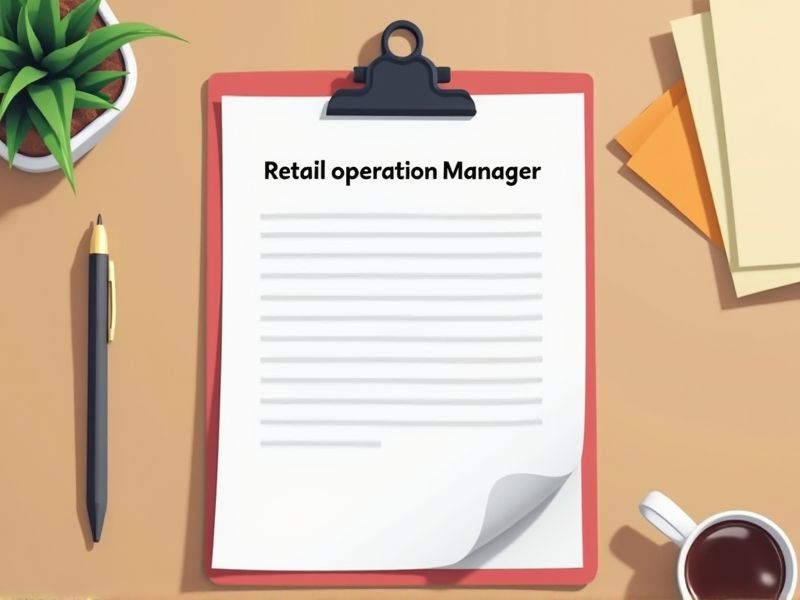
Retail Operations Managers oversee the efficiency and effectiveness of retail environments. Relevant certifications provide crucial knowledge in areas such as inventory management, customer service, and leadership skills, enhancing operational capabilities. The right certifications equip managers with strategic decision-making tools crucial for addressing market challenges. Here are some important certifications relevant to the role of a Retail Operations Manager.
Certified Retail Operations Manager (CROM) Certification
Retail Operations Managers face increasing complexity in overseeing multiple store functions, necessitating a CROM certification to ensure they have standardized skills and knowledge. Retail environments demand data-driven decision-making, and CROM certification provides updated training in analytics and technology use. The certification acts as a benchmark for industry standards, helping employers identify qualified candidates with proven competency. As retail dynamics evolve with consumer expectations, CROM certification equips managers with strategies to enhance customer experience and operational efficiency.
Retail Management Certification (RMC)
Retail Management Certification equips Retail Operations Managers with critical skills in inventory control and customer service, resulting in improved store efficiency. Certified managers often report enhanced understanding of retail technology, which plays a key role in streamlining operations. The certification also reinforces leadership abilities necessary for managing diverse teams and handling complex retail environments. The credential can increase job prospects and salary potential by demonstrating a commitment to professional development and industry standards.
Certified Customer Experience Professional (CCEP)
A Retail Operations Manager focuses on streamlining operations, and having Certified Customer Experience Professional (CCEP) accreditation ensures they prioritize customer satisfaction. This certification provides in-depth knowledge on improving customer interaction, directly impacting loyalty and repeat business. Mastering customer experience principles provides an edge in data-driven decision-making, crucial for competitive positioning. With CCEP, a manager better aligns operational strategies with customer expectations, increasing overall efficiency and profitability.
Lean Six Sigma Green Belt Certification
Lean Six Sigma Green Belt Certification equips Retail Operations Managers with essential skills to identify inefficiencies, enabling cost reduction and improved profitability. By understanding process improvement methodologies, managers can enhance customer satisfaction through streamlined operations and reduced wait times. The certification provides tools to collect and analyze data, driving informed decision-making and fostering a culture of continuous improvement. Expertise in Lean Six Sigma principles also strengthens leadership capabilities, aligning team efforts with strategic business objectives.
Project Management Professional (PMP)
Retail operations managers face complex projects involving supply chain, inventory, and workforce coordination. A PMP certification provides structured methodologies to enhance project efficiency and resource allocation. Controlled project timelines and improved risk management lead to cost savings and increased productivity. Certified professionals often bring enhanced communication skills, fostering team collaboration and stakeholder satisfaction.
Certified Supply Chain Professional (CSCP)
Having a Certified Supply Chain Professional (CSCP) enhances the understanding of an integrated end-to-end supply chain, essential for a Retail Operations Manager dealing with complex logistics. This certification equips managers with the knowledge to optimize inventory levels, reducing costs and increasing efficiency in retail operations. The CSCP credential provides the strategic insights needed to align supply chain strategies with business goals, ensuring competitive advantage. With a focus on risk management and sustainability, a CSCP-certified manager can better navigate disruptions, maintaining operational continuity in the retail sector.
Digital Marketing Certification
A Digital Marketing Certification equips a Retail Operations Manager with the knowledge to leverage online platforms effectively, leading to increased brand visibility and sales. Understanding digital marketing strategies ensures the manager can align marketing efforts with customer behavior trends. The certification provides insights into data analytics, enabling better decision-making regarding inventory and promotional tactics. It helps in adapting to evolving consumer preferences, ultimately enhancing customer engagement and loyalty.
Certified Business Process Professional (CBPP)
Certified Business Process Professionals (CBPP) bring a structured framework to improve business processes, which benefits retail operations managers struggling with complex process coordination. With the retail sector's reliance on efficient operations and customer satisfaction, a CBPP certification signals expertise in streamlining procedures to minimize delays and reduce costs. Retail operations managers can apply CBPP methodologies to enhance inventory management and supply chain logistics. CBPP training equips managers to manage data-driven decisions, aligning operations with strategic goals and increasing profit margins.
Certified Sales Professional (CSP)
A Certified Sales Professional (CSP) credential enhances a Retail Operations Manager's ability to implement effective sales strategies, leading to increased revenue. Having CSP-trained managers assures that best practices in customer engagement and service are consistently applied across the retail operation. By understanding advanced sales techniques, the Retail Operations Manager can more effectively train and develop staff, boosting store performance. Moreover, holding a CSP certification can improve the manager's negotiation skills, ensuring more favorable outcomes in supplier agreements.
Certified Fraud Examiner (CFE)
Retail operations managers face various fraud risks such as inventory shrinkage, employee theft, and vendor fraud. A Certified Fraud Examiner (CFE) possesses specialized skills to detect and prevent such fraudulent activities. Their expertise in risk assessment and control implementation helps maintain operational integrity. Integrating a CFE in retail management enhances trust and ensures compliance with anti-fraud regulations.
Summary
With certification, you may enhance your expertise in retail operations, resulting in improved store efficiency and customer satisfaction. You'll likely gain a competitive edge in your field, positioning yourself as a desirable candidate for promotions or new job opportunities. By applying the knowledge acquired through certification, you can optimize inventory management, leading to reduced costs and increased profitability. You may also foster a culture of continuous improvement, influencing your team to adopt best practices and achieve operational excellence.
